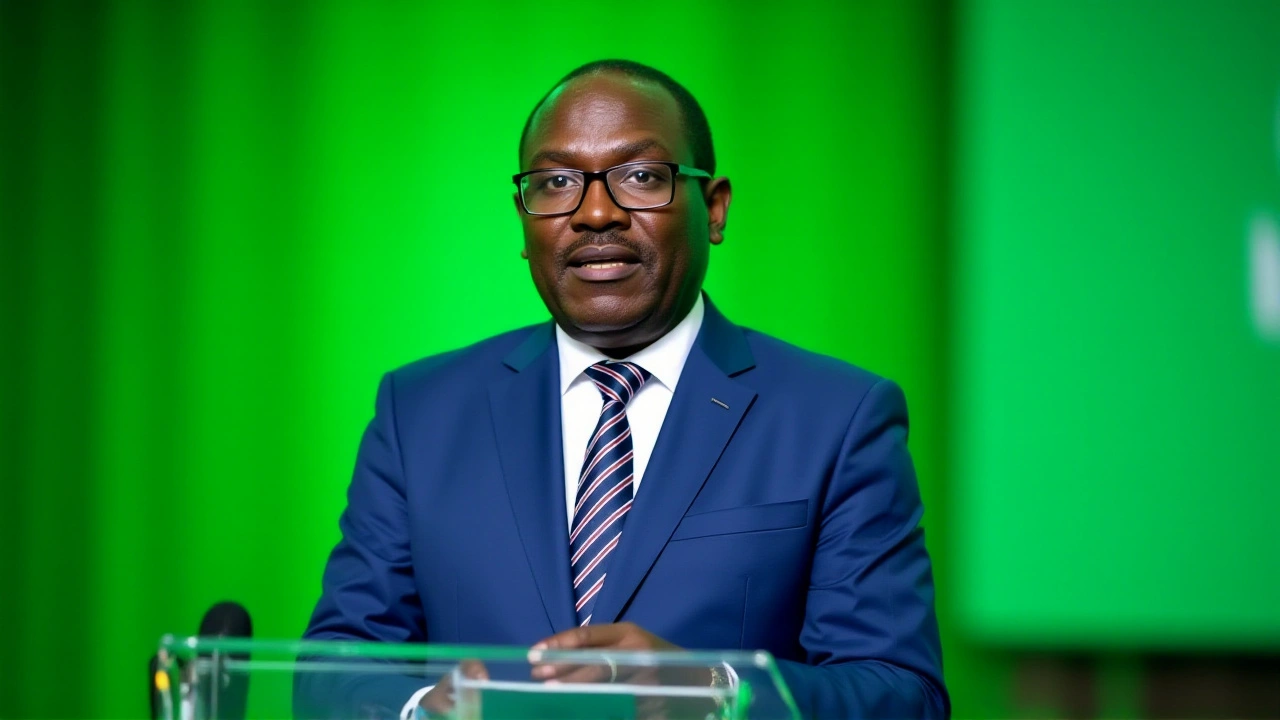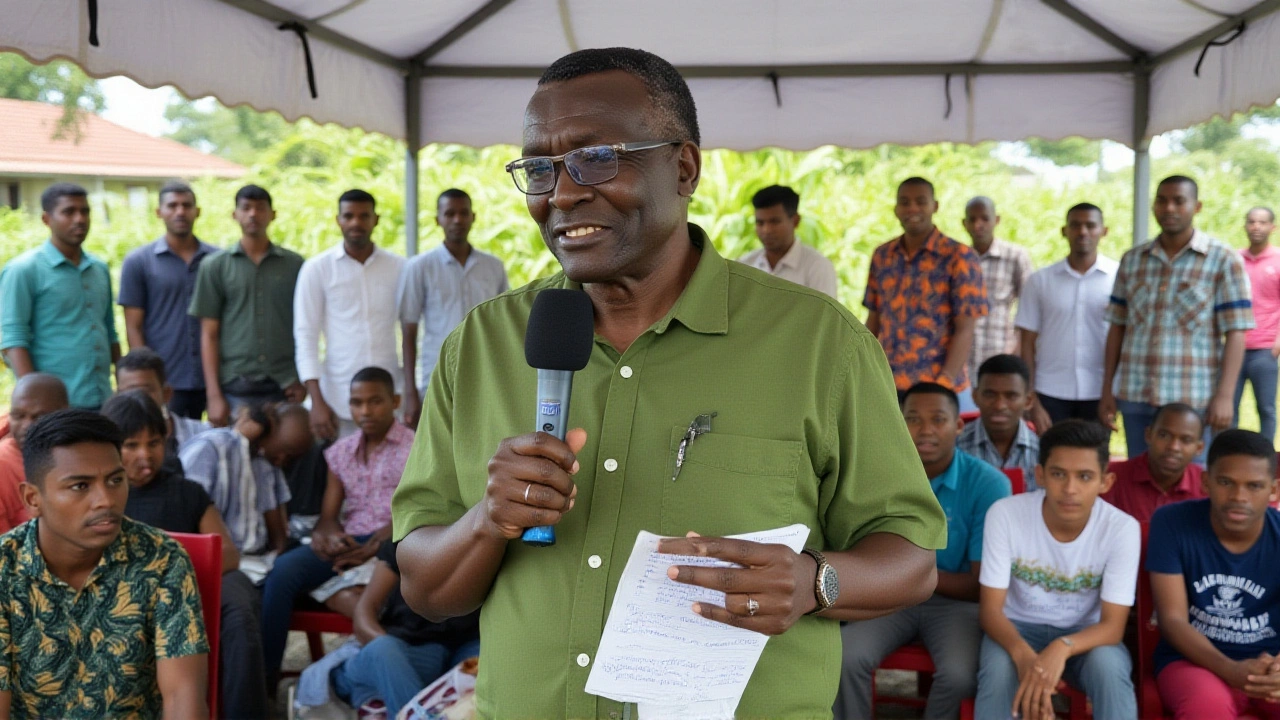When David Maraga, former Chief Justice of Kenya, spearheaded a youth voter registration drive in Nairobi on 29 September 2025, the streets buzzed with a mix of curiosity and urgency. The effort formed part of his broader People’s #BallotRevolution campaign, which aims to add roughly five million new names to the nation’s voter rolls before the 2027 general election. At the same time, the Independent Electoral and Boundaries Commission (IEBC) kicked off a 30‑day nationwide registration sprint, making the capital a focal point for both official and grassroots mobilisation.
Why the Drive Matters Now
Kenya’s youth, ages 18 to 35, make up more than 60 % of the population, according to the 2023 Kenya Demographic Survey. That demographic weight translates into a potential swing of several million votes – a fact that political strategists have been eyeing for years. Maraga’s campaign, launched publicly on 23 September 2025, seeks to turn that latent power into actual ballots.
"Together with a section of our youth, I will be visiting registration centres in Nairobi as we advocate for voter registration," Maraga said as he arrived at the first centre in Eastleigh. His tone was pragmatic, not theatrical – he was there to answer questions about ID requirements, the verification process, and how to transfer a registration to a new polling station.
Details of the Nairobi Tour
Over the course of the day, Maraga swung by three major registration hubs: Eastleigh, Westlands, and the bustling Uhuru Park kiosks. At each site, volunteers from his campaign distributed quick‑reference pamphlets that broke down the registration steps into bite‑size bullet points. Young voters responded enthusiastically, with many expressing relief at finally having a clear, trusted voice championing their participation.
- Applicants must be Kenyan citizens aged 18 or older.
- They need a valid National ID or passport.
- Previous registration, recent election offences, or a court‑declared mental incapacity disqualify them.
In Eastleigh, a university student named Amina (22) told us, "I was nervous about the fingerprint scan, but the staff were patient and explained everything. It felt like the system finally cared about us." Such anecdotes underline the campaign’s human‑centric approach.
IEBC’s Parallel 30‑Day Push
Coinciding with Maraga’s street‑level hustle, the IEBC announced a Continuous Voter Registration (CVR) exercise that will run until 28 October 2025. Chairperson Erastus Ethekon explained that the goal is to swell the current 22.1 million registered voters to somewhere north of 27 million.
The CVR offers four core services:
- New voter registration for first‑timers.
- Correction or update of existing voter details.
- Transfer of registration to a new constituency or polling station.
- Verification of voter information to prevent duplicate entries.
IEBC officials emphasized that the drive excludes areas currently holding by‑elections, but otherwise, any constituency office can process applications.

Reactions from Politicians and Experts
Political heavyweight President William Ruto lauded the combined efforts, noting that “a vibrant democracy starts with every eligible Kenyan having a voice at the ballot box.” Opposition leader Raila Odinga was more circumspect, urging that the registration surge be matched with genuine youth‑focused policies post‑election.
Electoral analyst Dr. Grace Njeri of the University of Nairobi warned that “numbers alone won’t guarantee turnout; the credibility of the process and the perceived relevance of the issues on the ballot are decisive.” She added that the #BallotRevolution’s diaspora outreach could become a game‑changer, given that roughly 2 million Kenyans live abroad and retain voting rights.
Future Steps and Potential Hurdles
Maraga has pledged to take the campaign to every one of Kenya’s 47 counties by early 2026, with a special emphasis on remote regions where registration centres are scarce. He also hinted at a digital “voter‑on‑the‑go” app that would let young people check their registration status via SMS.
However, logistical challenges loom. The IEBC’s past CVR rounds have been marred by occasional system crashes and accusations of “ghost voters.” Moreover, political parties are already mobilising resources to court the newly registered youth, raising concerns about campaign finance transparency.
All eyes will now turn to the upcoming 2027 general election. If the combined push indeed adds five million new voters, that could reshape the electoral map, especially in swing constituencies like Nakuru, Machakos, and Kitui.
Frequently Asked Questions
How many new voters does the #BallotRevolution aim to register?
The campaign targets roughly five million additional registrants before the 2027 election, boosting Kenya’s voter base from about 22.1 million to over 27 million.
What are the eligibility requirements for a first‑time voter?
Applicants must be Kenyan citizens aged 18 or older, possess a valid National ID or passport, and must not have been convicted of an election offence in the past five years or be declared of unsound mind.
Why is the youth demographic so crucial for the 2027 election?
Young Kenyans make up over 60 % of the population and therefore represent the largest possible voting bloc. Their turnout can swing tightly contested seats and influence which parties shape the post‑election agenda.
What services does the IEBC’s CVR exercise provide?
The CVR allows new registrations, updates to existing details, transfers to different constituencies or polling stations, and verification of voter information to prevent duplicates.
Will the campaign also reach Kenyans living abroad?
Yes. Maraga’s roadmap includes a diaspora outreach phase, recognising that roughly two million Kenyans overseas retain voting rights and could tip the balance in close races.






It’s almost theatrical how the former chief justice waltzes into Nairobi, waving registration forms like a savior, yet the systemic issues remain unaddressed. The real problem isn’t the number of names on a list, it’s the chronic disenfranchisement that creeps in through bureaucratic neglect. Young voters are being fed a glossy narrative while the structures that marginalize them stay intact. This spectacle distracts from the deeper reforms needed in the electoral calendar and voter education. If the aim is genuine democratic renewal, then parade‑like drives are merely window dressing.
The initiative, on its surface, appears to be a laudable effort to mobilize a demographic that constitutes the majority of Kenya’s population, which inherently carries the potential to reshape the political landscape. However, the efficacy of such a drive hinges on more than the sheer volume of registrations; it depends on whether these newly added voters will be meaningfully engaged throughout the electoral cycle. Historical data from previous elections indicates that spikes in registration often do not translate into proportional turnout, particularly when youth feel alienated from the policy discourse. Moreover, the timing of this campaign-aligning with the IEBC’s 30‑day sprint-raises questions about coordinated strategies between civil society and state apparatus. If coordination is robust, it could streamline processes, but it could also blur the lines of independence and create perceptions of partisan bias. The inclusion of an app to verify status via SMS could be a game‑changer, provided it is accessible and secure, but digital divides remain a barrier for many young Kenyans. Additionally, the campaign’s emphasis on physical registration hubs in Eastleigh, Westlands, and Uhuru Park is commendable, as it brings services directly to community hotspots, yet logistic constraints such as staff training and equipment reliability must be addressed. The reference to diaspora outreach further expands the scope, recognizing that roughly two million Kenyans abroad retain voting rights-a factor that could tilt results in close constituencies. Nonetheless, the overarching challenge lies in sustaining momentum post‑registration; without comprehensive civic education initiatives and policy platforms that resonate with youth priorities, the enthusiasm captured on registration day may dissipate. In sum, while the numbers are promising, the true measure of success will be reflected in voter turnout, informed participation, and the subsequent responsiveness of elected officials to youth concerns, all of which remain uncertain at this juncture.
Imagine a river that finally finds a channel after being forced underground for years; that’s what this movement feels like for many young Kenyans. The act of registering isn’t just a bureaucratic step-it’s an affirmation of belonging, a gentle reminder that the state hears our heartbeat. When we line up, hand over our IDs, and see our names etched into the civic ledger, we’re quietly reshaping the narrative of who gets to decide the future. It’s a modest act, yet it carries the weight of generations yearning for a voice. Let’s cherish these moments and keep the conversation alive beyond the paperwork.
I get where Ashutosh is coming from, but I also think any step toward inclusion matters, even if it looks theatrical. The fact that youths are actually showing up, asking questions, and walking away with a registration card is a positive shift. We can work on the deeper reforms while celebrating the momentum that this campaign generates.
While the dramatics may be noted, the pride of a nation must not be eclipsed by petty commentary. Mobilising five million youths is a patriotic triumph that strengthens Kenya’s sovereignty. The registration surge underlines our collective resolve to safeguard democratic continuity. We must focus on the strategic advantage this presents for national unity, not indulge in superficial criticism.
The establishment of a digital verification platform could streamline the process significantly, provided that cybersecurity protocols are rigorously observed. A well‑engineered system would reduce redundancy and enhance data integrity, thereby fostering confidence among the electorate.
Yay! This is super exciting news! I truly believe that when more young people get registered, the future will be brighter for us all. Keep up the good work and stay positive!
While the digital idea sounds nice, one must consider the ever‑present surveillance state. Every new data point is another vector for potential manipulation. It’s vital that this system remains transparent, otherwise we risk another layer of control disguised as convenience.
The emotional charge surrounding this campaign is palpable, yet I can’t help but feel the underlying fatigue of constant political promises. Young voters deserve more than fleeting enthusiasm; they need sustained engagement and tangible policy outcomes that reflect their aspirations.
It’s true that enthusiasm alone isn’t enough. The real test will be whether these newly registered youths actually turn out on election day. History shows that registration spikes often fade without a solid plan for voter education and motivation.
From an analytical perspective, the correlation between registration drives and actual voter turnout is complex. Studies suggest that targeted civic education, combined with community outreach, can improve the conversion rate. Therefore, integrating workshops on policy issues alongside registration could be beneficial.
Indeed, coupling registration with informational sessions could raise awareness about the significance of each vote. It would also empower young citizens to make informed choices, fostering a more robust democratic process.
Though the numbers look impressive, one must ask whether the integrity of the voter roll is being compromised by rushed registrations. Safeguards against duplication and fraudulent entries are essential to maintain electoral credibility.
Great point! Still, let’s not forget the human side-these youngsters are finally feeling seen, and that sentiment can’t be measured in spreadsheets alone.
This is a huge step forward for Kenya.
Absolutely! Every new voter adds a fresh voice to our national conversation, and that can only strengthen our democracy.
When I look at these massive registration pushes, I can’t shake the feeling that we’re being fed a narrative designed to placate restless youths while the real power brokers remain untouched. It’s a comforting illusion, a lullaby that masks the grinding realities of political patronage. The flood of IDs may swell the rolls, but without parallel reforms-transparent financing, accountable governance, and truly representative policy-those numbers become hollow tokens. Even the most eloquent speeches about youth empowerment can’t substitute for concrete action that addresses unemployment, education quality, and health services. Moreover, the specter of “ghost voters” continues to haunt the process, eroding trust. If we are to move beyond performative gestures, the momentum must be harnessed toward substantive systemic change.
👍 I hear you! Let’s keep the energy high and push for real change together! 🌟
The collaboration between civil groups and the IEBC could set a precedent for future civic initiatives, demonstrating that joint effort yields broader participation.
Sure thing but if they keep pushing this fake “inclusion” it'll just be another headline while the real issues stay hidden lol